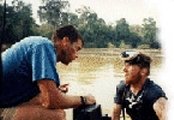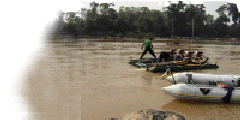Who is Dave McCracken?
 By Marcie Foley By Marcie Foley
Dave grew up on the East Coast of America.
His father was a career Naval Officer, mostly commanding submarines
during the cold war. Dave's mother worked as a registered nurse for most
of her life, in addition to raising four children. Dave has two
brothers, one older (Mike) and one younger (Tim), and a sister (Karen),
who is younger.
After high school, in 1973, Dave joined the Navy, and graduated UDT/SEAL
training class 77 in San Diego, California. He graduated as one of only
seven men, from a beginning-class of 57 enrollees (each who had to meet
very stiff enrollment requirements to even qualify). Most quit because
of the emotional duress and severe difficulty of the training program.
Here is an article written by Skin diver Magazine which covered the "hell week" which Dave went through in Seal Team training during 1974.
And here is Dave's personal story about
surviving
"hell week".
Dave spent four years in the Navy, stationed in Coronado, San Diego
with the UDT/SEAL teams. He made one tour to Vietnam/Westpac, and he
spent nearly a year working in the specialized "SDV" (Swimmer Delivery
Vehicle) program. These were very specialized portable wet-submarines
used to quietly transport SEAL platoons into difficult or guarded areas.
|
 |
 |
|
Dave (19-years old) at the time he
enlisted in the U.S. Navy |
Hell week Down to only 8 students remaining by the fifth week of
SEAL training, this is a picture of Dave and three other trainees
running relay-races in the mud-flats near Mexico (racing another
team of 4 trainees) on the sixth day of “hell-week” (Hell-week was
7-days of non-stop competitive activity with no sleep). |

|
Dave (3rd from right) and the other 6 graduates
of UDT/SEAL
Training Class 77 in 1974. |
There was nothing very interesting happening at the end of his 4-year
tour, so Dave did not re-enlist. Instead, Dave moved to Los Angeles and
started a commercial diving business, mostly performing underwater
maintenance on yachts. He also took on a very extensive self-study
program in business and philosophy.
Gold prices were going up dramatically during late 1979, and Dave began
to consider that he might be able to use his diving ability and
experience to recover gold from the bottom of California’s rivers. Dave
was also looking for a life outside of the city. He discovered (through
a magazine) that people were already using
suction dredges, so Dave made
a trip to Keene Engineering (in Northridge, California) to discover an
entire product-line of underwater mining equipment.
 The day after Christmas in1979, Dave launched his first expedition with
an old SEAL Team buddy and the buddy’s brother. They started in
southern
Oregon, and ended up in northern California 6 weeks later. After reading
all of the available literature on underwater mining, they found the
information was not much more than instructions on how to assemble the
equipment. The day after Christmas in1979, Dave launched his first expedition with
an old SEAL Team buddy and the buddy’s brother. They started in
southern
Oregon, and ended up in northern California 6 weeks later. After reading
all of the available literature on underwater mining, they found the
information was not much more than instructions on how to assemble the
equipment.
Dave and his partners had a very difficult time of it in the beginning,
trying to figure out by themselves workable methods of locating gold
deposits, especially during the bitter cold winter months when
water-levels were running high and muddy. It was several months of
severe hardship before Dave and his partners located their first
commercial-grade gold deposit (about $60 a day), which was enough to pay
expenses and feed them.
Dave’s partners lost interest before the spring-thaw, and departed with
the dredge, truck, and most of the other equipment they were using
together. The (ex) partners controlled a 2/3 share, so they sold the
equipment to recoup some of their losses and billed Dave for the
remaining third, since they put up the initial investment. Dave paid
that debt in full from gold he recovered several months later.
 After his partners left, Dave found himself alone in the forest, living
in a tent, with very few resources to get by on. Cold nights and an
empty stomach found Dave struggling to learn all he could about how to
find high-grade underwater gold deposits. He soaked up every bit of
knowledge he could get from the old miners he encountered along the
river. He could have returned to commercial underwater work in Los
Angeles, but Dave was determined to make a go of it in gold mining, and
not give up
until there was no other choice. In time, Dave figured out that the main
key to finding commercial gold deposits was in learning to
sample. After his partners left, Dave found himself alone in the forest, living
in a tent, with very few resources to get by on. Cold nights and an
empty stomach found Dave struggling to learn all he could about how to
find high-grade underwater gold deposits. He soaked up every bit of
knowledge he could get from the old miners he encountered along the
river. He could have returned to commercial underwater work in Los
Angeles, but Dave was determined to make a go of it in gold mining, and
not give up
until there was no other choice. In time, Dave figured out that the main
key to finding commercial gold deposits was in learning to
sample.
Shortly after his partners left, an acquaintance offered to grubstake
Dave with a dredge of his own, for a percentage of Dave’s gold recovery
until the dredge was paid for, with interest. Dave was able to pay off
the dredge within a short time because his skill at locating commercial
gold deposits had improved. Things were getting better as warmer weather
set in during the spring of 1980.
Dave wrote his
first book on gold mining while still living in a small
tent out in the forest -- so that others would have something to go by.
He went on to publish
four more books on gold mining techniques during
the next few years. Dave’s books remain widely acknowledged today as the
world’s authoritative work on underwater and most other types of
small-scale mining techniques.
Other miners on the Trinity River started calling Dave “Ounce-a-Day,”
because he always seemed to be getting that much gold or more when
dredging alone on the river.
Dave spent those first three years of his gold mining career living and
working out of a tent, writing his first two books by the light of a
Coleman lantern. By living this way and keeping expenses at a minimum,
he was able to channel profits into expanding the
production-capabilities of his dredging operation.
 During the summer of 1982, Dave led his two brothers and Eric Bosch (Dave's
dredging partner during that time and for many years later) on a gold
mining expedition to Canada and Alaska with four dredges. They spent
most of the 1982 mining season in British Columbia, making enough money
that Dave was able to take the next winter off, rent a nice warm
apartment, and write his third and fourth books. He began working upon
his
first video presentation that winter, and had it produced by a
professional video production company during 1983. Several more
video productions (also available in DVD format) followed shortly
thereafter. During the summer of 1982, Dave led his two brothers and Eric Bosch (Dave's
dredging partner during that time and for many years later) on a gold
mining expedition to Canada and Alaska with four dredges. They spent
most of the 1982 mining season in British Columbia, making enough money
that Dave was able to take the next winter off, rent a nice warm
apartment, and write his third and fourth books. He began working upon
his
first video presentation that winter, and had it produced by a
professional video production company during 1983. Several more
video productions (also available in DVD format) followed shortly
thereafter.
Investing his golden profits into further expansion, Dave hired a
researcher during 1983 to explore for the availability of mining claims
along the Klamath River in Northern California. The research proved to
be very successful. Operating his two commercial dredges along the
Klamath River, with a six-man crew running two shifts, while also taking
on about 30 students, the 1984 season was his most successful. Their
best day of recovery was 24 ounces of gold from a single dredge, and the
largest nugget recovered was over 15 ounces!
 Having accumulated
miles and miles of gold-bearing mining properties
along the Klamath River and its tributaries, Dave began work on forming
The New 49'er Prospecting
Organization in late 1985. As Dave’s name was already well known and
respected within the field of small-scale gold mining, the organization
quickly grew, both in mining claims and in people. Both the U.S. Forest
Service and the Bureau of Land Management have acknowledged this
organization as being legitimate under the 1872 mining law; because so
many of the members actually go out and develop high-grade gold
deposits. There is more serious small-scale gold prospecting activity
going on in Siskiyou County, associated with this group, than in
any
other location within the United States. Having accumulated
miles and miles of gold-bearing mining properties
along the Klamath River and its tributaries, Dave began work on forming
The New 49'er Prospecting
Organization in late 1985. As Dave’s name was already well known and
respected within the field of small-scale gold mining, the organization
quickly grew, both in mining claims and in people. Both the U.S. Forest
Service and the Bureau of Land Management have acknowledged this
organization as being legitimate under the 1872 mining law; because so
many of the members actually go out and develop high-grade gold
deposits. There is more serious small-scale gold prospecting activity
going on in Siskiyou County, associated with this group, than in
any
other location within the United States.
Dave now invests his time between May through September, providing
assistance to members of The New 49'ers and managing
Group Mining
Projects along the Klamath River and its tributaries in northern
California.

Schedule of Events
Between the months of October through April, Dave generally devotes his
creative energies into managing
team-mining
projects outside of America. Dave has prospected for gold in South
and Central America, Africa, Madagascar, Borneo, West Sumatra, Canada,
Viet Nam & Cambodia and other locations in Asia.
Dave's
Adventures
Dave's Summary of
Qualifications
Tuning Into the
Wavelength of Success
Hard Work
Never Give Up!
|



